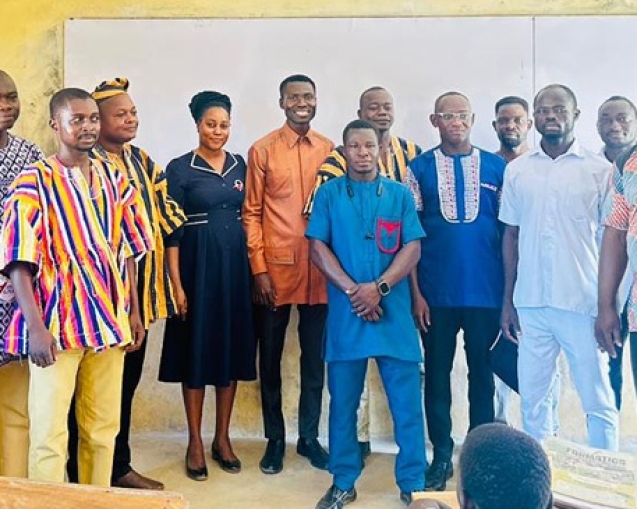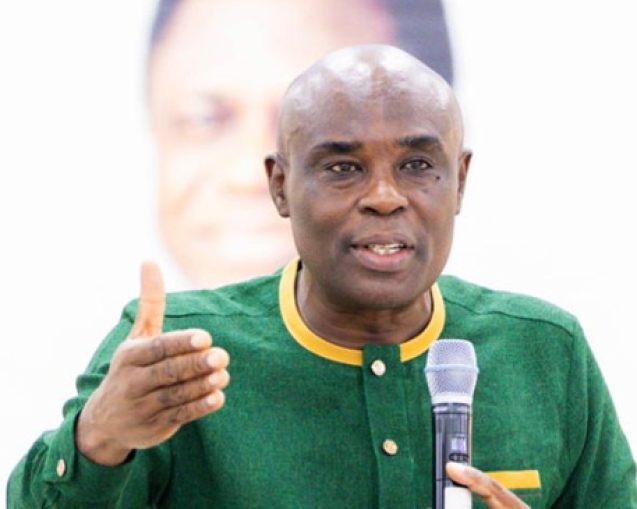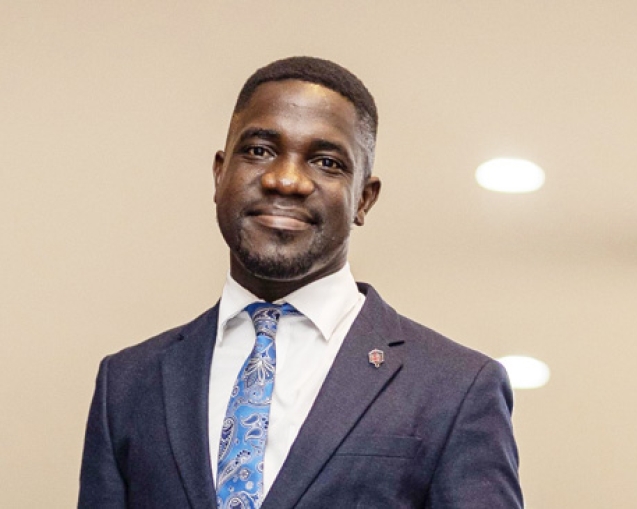- INTRODUCTION
In the rich tapestry of Christian theology, the concept of election, encapsulated in the term “eklektos,” holds weighty significance for understanding faith, identity, and transformative action. Derived from the Greek verb “eklegomai,” which means “to choose,” “eklektos” refers to those divinely selected for a specific purpose.
The PENSA China ITI Conference is one of the flagship programs of the Church of Pentecost China, serving as a vital platform for youth engagement, revival and empowerment. This annual four-day retreat has become a highly anticipated event, drawing members, associates, and believers from across the nation. The success of previous conferences has solidified its reputation as a transformative experience, fostering spiritual growth and community among participants.
This year’s Conference, held from October 3rd to 6th in Guangzhou City, Guangdong Province, emerged as a beacon of revival and empowerment for believers in the diaspora. This gathering united a diverse group of participants committed to preserving their Christian faith while navigating the complexities of life away from ‘home’. In a context where Christian faith and cultural identities are often challenged, the theme “Eklektos Emunah,” meaning “Chosen and Grounded in Faith,” resonated deeply, encouraging attendees to reflect on their divine selection and the responsibilities that accompany it.
In a nation where religious activities and gatherings face significant challenges, the existence of such conferences raises important questions about the state of the church in China. Many have wondered whether churches can thrive in this environment and how believers can maintain fellowship. The realization that COP China could successfully host the PENSA ITI Conference for the eight consecutive time is a testament to the resilience and determination of the church’s leadership in China. Many Christian missionaries had doubted the potential for such gatherings, yet the flourishing of the Church in China today defies those expectations.
The PENSA Ghana has been instrumental in igniting renowned revivals through the PENSA Ghana ITI Conference. Similarly, the successful execution of the PENSA China ITI Conference signals the emergence of a rising army of believers chosen, grounded, and equipped to transform the church in China and Asia at large. This youth empowerment initiative is essential for fostering indigenous membership and leadership within the church, thus, the vision of establishing indigenous churches led by local leaders is being realized.
Against this backdrop, this conference not only provoke great revival and empowerment but also serves as an essential instrument in the church’s quest to possess Asia for our Lord Jesus Christ. This article reflects on the significance of being “eklektos” within the context of the recent ‘EKLEKTOS EMUNAH’ PENSA China ITI conference under the theme “Chosen & Grounded to Transform Our Generation.” The article discusses highlights of this year’s conference, and its role in shaping the future of the church in China, emphasizing the need for continued support and engagement in youth empowerment initiatives.
- UNDERSTANDING ‘EKLEKTOS EMUNAH’, THE NATURE OF ELECTION, GROUNDED IN TRUTH, AND TRANSFORMATIVE ACTION
The theme “Eklektos Emunah” profoundly encapsulates the dual realities of being divinely chosen and firmly anchored in faith. This concept is richly informed by scripture, particularly in Colossians 2:6-7, which exhorts believers to be deeply rooted and continually built up in our relationship with Christ. Similarly, 1 Peter 2:9 confirms the identity of believers, referring to us as a “chosen people” and a “royal priesthood”, thereby underscoring the inherent dignity and purpose bestowed upon us. Such a theme not only affirms the believer’s identity but also delineates the responsibilities that accompany this divine selection. As articulated by Elder Clement Apaw, the 2024 PENSA China ITI Coordinator, a profound understanding of our identity in Christ significantly influences our actions, shapes our relationships, and enhances our overall impact in our communities. This recognition compels us to live out our faith with intentionality, fostering a transformative presence that resonates beyond personal boundaries and into the fabric of society.
The term “eklektos,” prominently articulated in the New Testament, particularly within the epistles of the Apostle Paul, embodies the concept of divine selection and an invitation to fulfill a higher calling. In Ephesians 1:4, Paul emphasizes that believers were “chosen before the foundation of the world,” a declaration that highlights the depth of this divine election, rooted in God’s omniscience and sovereign will. This foundational truth asserts that our identity as “chosen ones” transcends mere theological discourse; it manifests as a tangible reality that profoundly influences our lives and missions.
Scriptural depictions of election serve as a testament to God’s grace and sovereignty. Romans 11:29 reinforces the notion that this divine selection is irrevocable, reflecting an eternal blueprint for humanity that God has meticulously crafted. Crucially, the basis of this election is not found in human merit but in the boundless love and purpose of God. This understanding liberates believers from the weight of self-justification, inviting us into a transformative relationship characterized by grace and acceptance. In embracing this identity, individuals are empowered to live authentically, free from the constraints of societal expectations, and encouraged to engage in a mission that reflects the love and purpose of God. Thus, the concept of “eklektos” not only defines who we are but also propels us toward a life of meaningful impact and service to our communities.
Additionally, the concept of being “eklektos” transcends the realm of individual salvation, encompassing a rich communal identity that binds us as members of the body of Christ. This collective identity calls us to embody the values inherent in the Kingdom of God, compelling us to reflect His character in our daily interactions and decision-making processes. Such a shared identity not only empowers us but also equips us to engage meaningfully with the world around us, fostering transformative change within our communities.
To identify as “eklektos” necessitates a firm grounding in truth. As articulated in Titus 1:1, the knowledge of truth is foundational for cultivating godliness. As a youth, this truth is not merely an intellectual acknowledgment; it represents a transformative reality that shapes our lives and drives us to align with God’s will. It influences our actions, nurtures our relationships, and informs our societal engagement, urging us to mirror the character of Christ in every aspect of our existence.
In an era marked by immorality, the church is called to stand as a beacon of truth. Our grounding in this truth equips us to navigate the complexities of contemporary life, offering clarity and direction amid chaos. As “chosen ones”, we bear the responsibility of upholding the Gospel’s truth, advocating for justice, mercy, and love in a society that frequently prioritizes self-interest over communal well-being.
Moreover, being “eklektos” entails a profound mandate for transformative action. The Apostle Paul consistently underscores the significance of good works as a natural response to God’s grace. In Titus 2:14, he emphasizes that Christ sacrificed Himself to redeem and purify a people zealous for good deeds. This call to action is not merely optional; it is an essential aspect of our identity as believers.
In our current generation, the urgency for transformation is unmistakable. Social injustices, moral decline, and spiritual apathy pose significant challenges to the church’s witness. However, as “eklektos,” we are uniquely positioned to effect meaningful change. Our divine election empowers us to confront societal issues with both courage and compassion, advocating for the marginalized and voiceless. By embodying the love of Christ, we can inspire hope and facilitate healing within our communities, thereby fulfilling our calling as agents of transformation in a world in desperate need of renewal.
- THE PENSA CHINA ITI CONFERENCE 2024
The Church in China has astutely recognized the pivotal role that urban centers, such as Guangzhou, play in hosting transformative youth conferences. Pastor Paul Agyemang, the national head, eloquently articulates this vision, emphasizing that “to win the city of Guangzhou is to win the Guangdong province, and to win the province is to win the nation.” This assertion highlights the impact that influencing Guangzhou can have on catalyzing significant positive changes across China. The city stands as a vibrant tapestry of cultures, home to a diverse population that includes a considerable number of international migrants from regions such as Africa and Southeast Asia. This multicultural landscape not only enriches the city but also enhances the potential for cultivating a church that is multi-racial, multi-national, and multi-generational.
This dynamic presents a compelling paradigm, first for COP China and subsequently for the broader African-led ministry across Asia and the Far East Oceania regions. The current conference marks the eighth consecutive event organized by the Youth Ministry of COP China, reflecting a commitment to outreach.
While the church is predominantly Ghanaian-led, its efforts to engage indigenes have faced challenges. Gratifyingly, the PIWC Guangzhou (local and English) recently welcomed a number of indigenous members. Thus, the PENSA China ITI conference is a vital opportunity for revival, aiming at extending its influence beyond the Ghanaian community in China to encompass individuals from various nationalities, particularly the indigenes, and to foster essential networking opportunities while igniting an atmosphere conducive for spiritual renewal.
It’s worth mentioning that, this conference draws parallels to the well-known PENSA Ghana conference initiative, representing a deliberate effort to transplant the revival typology of the PENSA Ghana conference to the context of China.
Consequently, the PENSA China ITI conference emerges as a model worthy of further exploration, particularly for African-led churches operating in regions where there are restrictions. This initiative embodies a strategic approach to spreading the gospel of Jesus Christ throughout Asia and beyond, including the Arabian nations. It possesses the potential to ignite a revival that could profoundly awaken Christian spirituality within the Asian context, thereby reshaping the religious landscape and fostering a renewed commitment to faith among diverse communities.
Among the many impactful sessions of the conference, several stood out and garnered significant attention, underscoring its importance. Foremost among these is the conference’s role as a unique platform for fellowship and reunion. The conference served as an exceptional venue for fostering connections and strengthening the bonds of Christian fellowship. Echoing the sentiments of the Psalmist, who extols the beauty and joy of communal living among believers, this conference embodies the spirit of unity and togetherness. The last occurrence of this conference in Guangzhou dates back to 2016, making this year’s event particularly momentous as it marks the second in-person gathering since the onset of COVID-19 restrictions on mass gatherings in China. This year’s conference thus represented a long-awaited opportunity for old schoolmates to reconnect, reminisce about shared experiences, and rekindle the warmth of camaraderie. After years of virtual fellowship, where the church in China adapted to online services due to pandemic constraints, this event provided a rare chance for participants to engage face-to-face. The transition to e-church had been fully operational in China since 2019, and the conference served as a significant milestone in re-establishing in-person interactions. Moreover, the conference was not solely an opportunity for those present; it also embraced a broader audience through live broadcasts on various social media platforms, including Zoom, YouTube, and Facebook. This initiative ensured that virtual attendees could partake in the transformative teachings, spiritual impartations, and divine guidance being shared, thereby extending the reach of the conference beyond physical boundaries. This approach was instrumental in piloting the church’s innovative e-church model, particularly in alignment with the current agenda of unleashing and possessing the nations.
It’s imperative that speakers for the seminar session, Dr. Mrs Faustina Amofa Oduro and Mr. Kwame Antwi, highlighted the importance of fostering connections that transcend cultural barriers, creating a nurturing environment where individuals can find solace and belonging. This session served as a poignant reminder that, as believers chosen and grounded in faith, we are called to be vessels of healing and hope, cultivating spaces that empower others to thrive emotionally and spiritually. The seminar sessions also brought to light some practical strategies for navigating the complexities of establishing business in China. The discussions at the business seminar session transcended mere business mechanics; it was a clarion call for attendees to embrace their God-given talents and entrepreneurial spirit as instruments of transformation. Such inspired participants to view their ventures as opportunities to fulfill their divine purpose, reinforcing the conference theme that being “eklektos” empowers believers to effect meaningful change in the society. Together, these seminars encapsulated the essence of the conference, illustrating how being chosen and grounded equips individuals to confront challenges and seize opportunities for growth and impact.
The teachings delivered by guest speakers, including Apostle James Raj and Elder Seth Peasah, played a crucial role in this spiritual awakening. Apostle Raj emphasized the unparalleled power of the scriptures, asserting that faith is the key to unlocking the promises contained within. He highlighted the enduring truth of the Bible, which, despite being written on transient materials, continues to resonate with transformative power across diverse lives impacting all walks of life, including the lost and broken. His message underscored the importance of being firmly rooted in Christ, the living Word, who serves as our steadfast foundation amidst life’s challenges. Furthermore, he called upon participants to cultivate a life of love both towards God and their neighbors, emphasizing that love is the bedrock of a vibrant faith. Elder Seth Peasah’s teachings further enriched the conference experience, as he drew a compelling distinction between mere observers and active participants in any church settings and in our spiritual journey. He articulated that while spectators may invest in events, it is the partakers who reap the true rewards of divine engagement. His insights into the necessity of the Holy Spirit’s infilling and the wisdom that accompanies it resonated deeply with the audience. He encouraged attendees to seek fellowship with like-minded believers, particularly during challenging times, reinforcing the idea that collective prayer and support amplify spiritual growth. Elder Peasah also highlighted the significance of honoring leaders, regardless of their age, as this respect can unlock hidden blessings and foster a spirit of unity.
The conference reached its zenith during the Prayers and Holy Ghost Baptism service, which was not merely a ceremonial act but a profound encounter with the Holy Spirit. This service served as a powerful catalyst for personal and communal transformation, empowering participants to embrace their identities as “eklektos”, the chosen ones. The fervent prayers and the baptism of the Holy Ghost experience invigorated attendees.
It is equally imperative to highlight the integral role of music, drama and choreography, in shaping the spiritual atmosphere and enhancing participant engagement at the conference. Music has long served as a conduit for connecting the human experience with the divine, and this conference exemplified that tradition. Under the ministration of the COP China mass choir, attendees were treated to an exquisite array of theme songs, traditional Pentecostal choruses many of which were thoughtfully translated into Chinese, and reflective hymns, all interwoven with contemporary melodies. This rich assemblage of sound not only elevated the worship and praise experience but also fostered a profound sense of community among participants, creating an environment ripe for spiritual transformation. A notable highlight of the praise and worship night was the ministration by the Nigerian Christian community group, renowned for their vibrant Igbo traditional songs. Their ministration featured captivating appellations, distinctive drum rhythms, and dynamic dance movements, all harmonized with the symphonic melodies of Igbo lyrics. Remarkably, the essence of their ministration transcended linguistic barriers; one need not understand the language to fully appreciate the profound connection fostered through music. This communal experience exemplified the universal language of worship and praise, inviting all participants to engage in a shared celebration of faith and culture.
Moreover, the captivating ministration from the drama team at this year’s conference cannot be overlooked. These art forms transcended mere entertainment; drama and choreography are powerful vehicles for conveying the word of God. Through carefully choreographed movements, expressive storytelling, evocative soundscapes, drama and dance, participants were engaged on multiple levels, inviting them to visualize and internalize the revelations found in the theme for the conference. These artistic expressions served as a structured sacred system, utilizing movement, dialogue, and illumination to draw individuals into a deeper awareness of God’s presence. Through the drama and choreography, participants were not only encouraged and enlightened but also empowered to embrace their roles as agents of change in their communities.
- RECOMMENDATIONS AND FUTURE PROSPECTS
The findings from the recent PENSA China ITI Conference underscore the vital importance of cultural diversity in the church’s mission to embrace a multi-generational and multi-national community. The harmonious participation of indigenous members alongside Ghanaian congregants paints a vivid picture of a faith community that genuinely reflects the global dimensions of the church today. As we endeavor to cultivate an environment where indigenous leadership can flourish, we must place a renewed emphasis on initiatives aimed at empowering the youth. This focus is paramount for not only the sustainability but also the vibrant growth of the church in an ever-evolving socio-cultural landscape.
To the stakeholders, including church leaders, educators, and organizers, it is essential to champion the establishment of programs designed to build the spiritual and leadership capabilities of our youth in the diaspora. Meaningful engagement across cultural boundaries will significantly bolster the church’s contributions to community development, and fostering inclusive spaces that promote open dialogue will cultivate fellowship among diverse congregations, thereby enhancing unity and resilience within the church body.
A particularly salient recommendation is to invest in language accessibility at such conferences. For instance, providing translation and interpretation services, especially into Chinese, will empower indigenous participants to feel a sense of belonging and ownership. When attendees can engage in their native language, it nurtures a deeper connection to the community and amplifies the impact of the conference’s teachings. Furthermore, the integration of multimedia tools that facilitate real-time translation can serve as a robust mechanism for bridging communication gaps, thereby enriching the overall conference experience.
I also advocate for a shift in the linguistic dynamics of church events. While the use of ‘Twi’ has its place, it is prudent to minimize its prevalence in conferences targeted at attracting a diverse audience. This approach ensures that the church does not inadvertently convey a sense of Ghanaian cultural dominance, but rather one of inclusivity and shared responsibility across ethnicities.
Additionally, given China’s remarkable advancement in multimedia technology, there exists a unique opportunity for the church’s media ministry to harness these resources effectively. By equipping the media team with state-of-the-art tools and training, the church can significantly enhance its multi-platform presence and create content that resonates with a broad audience, thus magnifying outreach efforts both locally and internationally.
For future research, it is encouraged that scholars dive deeper into the long-term impacts of youth empowerment initiatives within diaspora communities, particularly in areas where religious practices face restrictions. Analyzing the dynamics of cultural integration and its relationship with church growth and community engagement will yield invaluable insights into the evolution of faith practices in an increasingly globalized context.
- CONCLUSIONS
In conclusion, the 2024 PENSA China ITI Conference emerged as a pivotal juncture for revitalizing Christian faith among the youth in China, reinforcing the theme of “Eklektos Emunah” as a powerful reminder of being chosen and grounded in faith. Through its multifaceted approach, the conference not only fostered profound spiritual connections among participants but also embraced the rich tapestry of cultural diversity within the church. The impactful teachings delivered by distinguished speakers, along with the vibrant expressions of worship and praise, served as vital catalysts for personal and communal transformation, igniting a renewed sense of purpose and empowerment. By highlighting the imperative role of youth engagement, indigenous leadership, and collaborative efforts across cultural divides, the conference set the stage for the church’s continued growth and resilience in an increasingly complex global landscape. Furthermore, the recommendations derived from the conference provide a blueprint for the church’s future endeavors, emphasizing the need for greater inclusivity and the strategic empowerment of youth as key to sustaining its growth. This forward-thinking vision underscores the importance of fostering cultural understanding and providing accessible communication methods, ensuring that all members feel valued and engaged. Collectively, these elements signify not just a moment of revival but a lasting commitment to shaping a vibrant Christian community capable of navigating the challenges of the modern world. As participants embody their identities as “eklektos,” they are encouraged to actively engage in transformative actions within their respective spheres, thereby facilitating change and contributing to the ongoing mission of the church in the diverse context of contemporary society.
By Dr Emmanuel Mintah Bonku (Shanghai City Worship Center, Cop China)


















